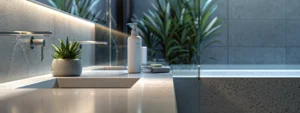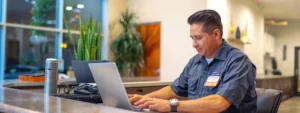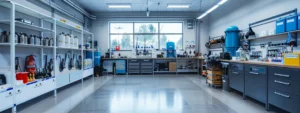Guide to Gentle Yet Powerful Drain Unclogging
Clogged drains are a frustrating issue many homeowners encounter. This guide offers practical solutions to unclogging without harsh chemicals. Readers will learn about common causes of clogs, essential tools for DIY methods, and when it’s time to call a professional. By following these steps, homeowners can efficiently address drain problems, ensuring smooth flow and preventing future blockages. Effective unclogging not only saves time but also maintains the home’s plumbing system, addressing a significant pain point for many. Engage with this guide to discover gentle yet powerful methods for drain unclogging.
Key Takeaways
- Regular drain maintenance helps prevent serious clogs and plumbing issues
- Utilize eco-friendly methods like vinegar and baking soda for safer cleaning
- Educate household members on proper disposal habits to minimize blockages
- Recognize signs of severe blockages to avoid more extensive plumbing problems
- Professional drain services offer expertise for complex plumbing issues beyond DIY methods
Understand Common Causes of Clogged Drains

Clogged drains can result from various factors, particularly in the kitchen and bathroom. Kitchen drain blockages often stem from grease buildup and food waste, while bathroom clogs frequently arise from hair and soap residue. Investigating shower and tub clogs reveals similar issues, where products like detergent can contribute to obstructions. Employing tools such as a clothes hanger or treating drains with a disinfectant can be effective in addressing these problems.
Identify Kitchen Drain Blockages
Kitchen drain blockages often occur due to the accumulation of grease and food particles, which can create stubborn clogs in the sink. Grease solidifies as it cools, leading to an obstruction that prevents water from flowing freely. To mitigate this issue, homeowners can adopt simple practices like disposing of cooking oils appropriately and utilizing a strainer to catch food debris.
Another common source of kitchen clogs includes foreign objects and plastic waste inadvertently washed down the sink. Items like packaging wrappers or utensils can contribute to significant blockages that require immediate attention. Utilizing safe and effective methods, such as using sulfuric acid cautiously or opting for gentle unclogging tools, can help restore proper drainage while minimizing the risk of water pollution:
- Understand the role of grease and food waste in drain blockages.
- Identify foreign objects, such as plastic waste, that may cause clogs.
- Implement preventive measures to reduce kitchen sink obstructions.
Recognize Bathroom Clogs
Bathroom clogs frequently occur due to the accumulation of hair, soap residue, and other personal care products within the pipes. These materials can combine to create substantial blockages, impeding the flow of water and often leading to more significant plumbing issues. Homeowners are encouraged to use a stopper in their sinks and tubs to catch hair and debris before they enter the drain, significantly reducing the likelihood of clogs.
In many cases, individuals may resort to chemical drain cleaners to address these obstructions. While these products can be effective, they often pose environmental concerns and can damage plumbing over time. Instead, opting for environmentally friendly solutions, such as natural drain cleaners or simple methods like hot water and baking soda, can effectively clear slow drains without harming the pipes or the planet.
Investigate Clogs in Shower and Tub
Clogs in the shower and tub often occur due to the accumulation of hair, soap scum, and other debris that gradually builds up in the drain. Homeowners may notice slow draining or standing water, indicating a significant drain clog that requires prompt attention. Regular maintenance, such as using a drain cover to catch hair and debris, can help prevent these obstructions from forming.
In situations where a clog develops, employing methods like hydro jetting can effectively remove stubborn blockages without harming the pipes. This technique utilizes high-pressure water to clear debris and restore proper flow in the shower or tub. By addressing drain clogs promptly with proper techniques, homeowners can maintain efficient drainage and avoid more extensive plumbing issues down the line.
Keeping drains clear begins with understanding their common foes. Next, gather the right tools; preparation makes the task at hand much simpler.
Gather Essential Tools for DIY Unclogging

To effectively tackle drain clogs, homeowners should gather essential tools for a DIY approach. Basic hand tools from the pantry, along with natural cleaning agents like borax and hydroxide, can address issues like soap scum and buildup. Additionally, considering specialized drain tools can enhance the unclogging process, ensuring hygiene and efficiency in maintaining clear drains.
Utilize Basic Hand Tools
Homeowners can effectively address clogged drains by utilizing basic hand tools readily available in their toolkit. A wire hanger can be transformed into a useful tool for removing hair and debris from blocked drains. Simple techniques, such as straightening the wire and creating a small hook, can help extract stubborn clogs without damaging pipes.
Another effective method for clearing minor blockages involves chemical solutions like sodium bicarbonate and sodium hydroxide. Homeowners can create a powerful yet gentle cleaning solution by combining these ingredients with hot water to dissolve soap scum and grease. Those seeking effective drain cleaning services may find it beneficial to learn these DIY approaches as they can often manage issues before they escalate.
| Tools | Purpose |
|---|---|
| Wire Hanger | Remove hair and debris from drains |
| Sodium Bicarbonate | Dissolve soap scum |
| Sodium Hydroxide | Clear stubborn blockages |
Use Natural Cleaning Agents
Utilizing natural cleaning agents is an effective method for unclogging drains while being gentle on plumbing systems. One popular option is using enzymes, which work to break down organic material in drains through a chemical reaction. For instance, combining hot water with lemon juice creates a potent mixture that can help dissolve buildup without causing harm.
Another practical solution involves boiling water and using it alongside a drain snake to dislodge stubborn blockages. The heat from the boiling water can loosen debris, while the drain snake allows for direct removal of hair and solid waste. Homeowners can easily implement these methods, offering a sustainable way to maintain clear and functional drains:
- Hot water and lemon juice for natural cleaning.
- Using enzymes to break down organic material.
- Boiling water combined with a drain snake for effective clog removal.
Consider Specialized Drain Tools
Utilizing specialized drain tools can significantly simplify the process of unclogging drains. Options such as drain snakes and augers are designed to navigate through the bend of pipes, effectively dislodging stubborn clogs caused by hair, food particles, and even oil buildup. These tools allow homeowners to address drainage issues efficiently, reducing reliance on emergency plumbing services for minor clogs.
Another useful tool is the plungers specifically designed for various types of drains. Sink plungers have a flat base, while toilet plungers feature a flanged end that creates a better seal. Investing in these specialized tools not only provides a reliable solution for common clogs but also empowers homeowners to maintain their plumbing systems proactively, helping to prevent future drainage problems.
| Tools | Purpose |
|---|---|
| Drain Snake | Dislodge stubborn clogs in pipes |
| Auger | Reach deep blockages |
| Sink Plunger | Clear blockages from sinks |
| Toilet Plunger | Address clogs in toilets |
With tools in hand, action awaits. Now, it is time to apply gentle methods for effective clog removal.
Apply Gentle Methods for Clog Removal

Effective drain unclogging can be achieved through gentle methods that maintain plumbing integrity while addressing blockages. Homeowners will find that solutions using baking soda and vinegar can not only eliminate bacteria but also break down buildup. Employing boiling water techniques can flush away leaks, while using a plunger provides necessary suction for minor clogs, ensuring smooth drainage.
Use Baking Soda and Vinegar Solutions
Baking soda and vinegar serve as effective natural solutions for unclogging drains. When combined, these ingredients create a chemical reaction that breaks down organic matter, soap residue, and other debris in pipes. Homeowners can start by pouring one cup of baking soda down the drain, followed by one cup of vinegar, allowing the mixture to fizz for several minutes before flushing it with hot water for optimal results.
This method not only unclogs drains but may also keep plumbing systems healthy by preventing future buildups. Using a plunger after the chemical reaction can further assist in clearing any remaining blockages, ensuring smooth water flow rather than needing extensive pipe repair and replacement. With these simple steps, individuals can effectively maintain their drains without resorting to harsh chemical cleaners that might damage their plumbing.
| Steps | Description |
|---|---|
| Pour Baking Soda | Introduce one cup of baking soda into the clogged drain. |
| Add Vinegar | Follow with one cup of vinegar to trigger a fizzing reaction. |
| Flush with Hot Water | After waiting a few minutes, flush the drain with hot water. |
| Use a Plunger | Employ a plunger to clear any residual blockages further. |
Employ Boiling Water Techniques
Boiling water techniques can be an effective, straightforward solution for unclogging drains, as hot water helps to dissolve grease and soap buildup, providing a powerful mixture against stubborn blockages. Homeowners can simply boil a pot of water and carefully pour it down the drain in stages, allowing it to work through the pipes gradually. This method can dislodge clogs without the need for harsh chemicals, making it a gentle alternative to more aggressive approaches.
In addition, using boiling water in conjunction with baking soda creates a chemical reaction that enhances its effectiveness. For instance, after pouring the boiling water, introducing sodium bicarbonate can target remaining residues. This combination not only assists in clearing obstructions but can also aid in leak detection, as any persistent issues may indicate underlying problems that require further attention. By employing these gentle techniques, homeowners can maintain their plumbing systems and minimize the risk of further complications.
Try a Plunger for Minor Clogs
A plunger serves as an effective tool for addressing minor clogs in bathroom drains, especially when traditional remedies fail. By creating suction and pressure, a plunger can dislodge objects causing blockages, leading to smooth drainage without the need for harsh chemical solutions. Homeowners may find that a few vigorous plunges can clear clogs caused by soap residue or other organic materials, providing a simple yet powerful alternative to commercial drain cleaners.
This method is particularly useful in situations where water backs up in the sink or tub, creating potential messes and inconvenience. For instance, using a plunger on a tub sink can prevent water from overflowing onto rugs and carpets, thereby minimizing household damage. Engaging in this straightforward technique not only addresses immediate drainage issues but also reduces the likelihood of more significant plumbing repairs in the future.
Sometimes, gentle methods won’t cut through the stubbornness of a clog. When that happens, safer chemical solutions stand ready to help clear the way.
Explore Safe Chemical Solutions
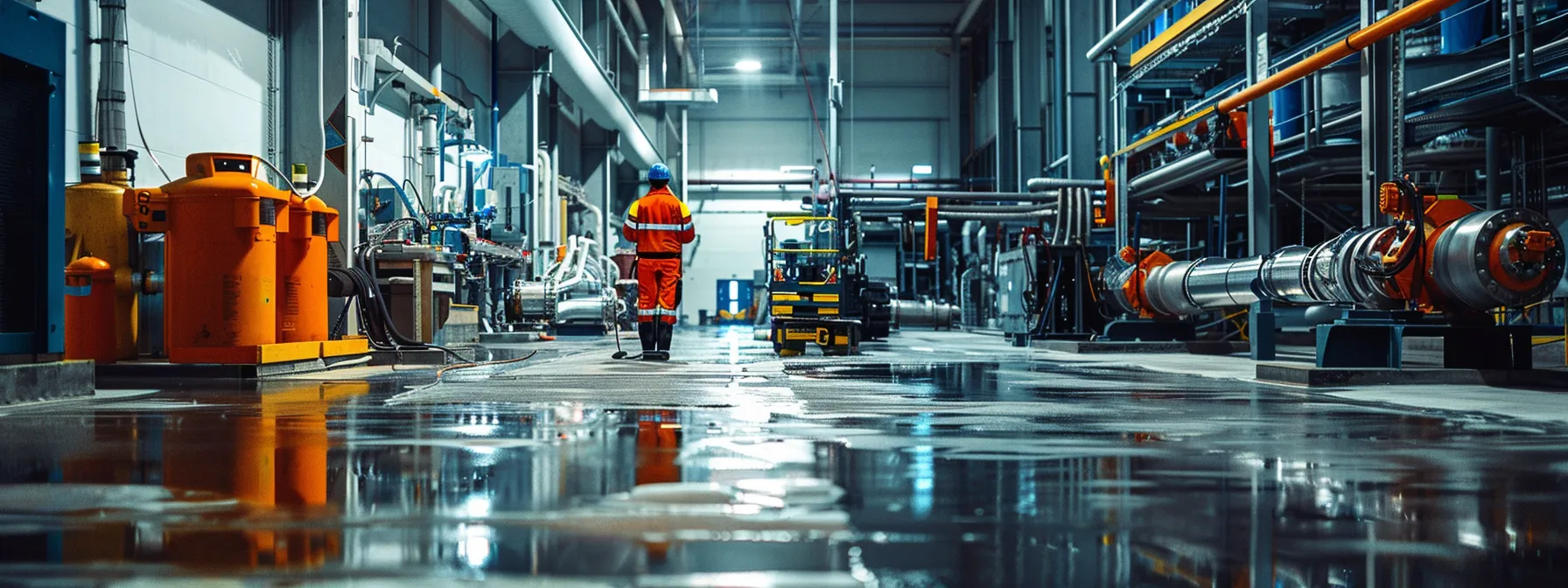
Identifying eco-friendly drain cleaners is an essential step for safe drain cleaning practices. Assessing the impact of chemical use helps ensure the health of both plumbing systems and the environment. Understanding how to use chemicals safely in the bathtub and other areas can prevent damage while effectively addressing clogs. These considerations provide valuable insights for homeowners seeking effective, responsible solutions.
Identify Eco-Friendly Drain Cleaners
Eco-friendly drain cleaners offer a safe alternative for unclogging drains without harming the environment or plumbing systems. These products typically contain natural ingredients that break down organic waste effectively while minimizing toxicity. For instance, cleaners that utilize enzymes work to dissolve buildups naturally without introducing harsh chemicals into the household. This approach aligns with the growing concern for sustainable practices in home maintenance.
Homeowners can easily create their own eco-friendly solutions using common household items. A mixture of vinegar and baking soda can serve as a gentle yet powerful cleaner for minor clogs. When combined, these substances create a chemical reaction that helps to clear drains effectively. Understanding and utilizing these environmentally responsible options allow individuals to maintain their plumbing systems while prioritizing safety and sustainability:
| Eco-Friendly Solution | Purpose |
|---|---|
| Vinegar and Baking Soda | Break down organic waste and clear clogs |
| Enzymatic Cleaners | Dissolve buildups naturally |
| Hot Water | Loosen grease and soap residue |
Assess the Impact of Chemical Use
Assessing the impact of chemical use in drain cleaning is essential for homeowners aiming to maintain effective and sustainable plumbing systems. Many chemical cleaners are designed to break down clogs quickly, but they can also harm pipes over time and create environmental concerns. Therefore, it is crucial to choose products that are biodegradable and less corrosive to ensure long-term safety and efficiency within a household’s plumbing infrastructure.
Opting for eco-friendly alternatives, such as enzymatic cleaners or natural ingredients, can provide a safer approach to unclogging drains without compromising effectiveness. These solutions typically work by utilizing natural processes to digest organic material, thereby minimizing the risk of damage to plumbing while promoting environmental stewardship. Homeowners should consider the long-term implications of their cleaning choices, ensuring they contribute to a healthier home and planet:
| Eco-Friendly Solution | Benefits |
|---|---|
| Enzymatic Cleaners | Break down organic material naturally, reducing the risk of pipe damage |
| Vinegar and Baking Soda | Effective for clearing clogs without harsh chemicals |
| Hot Water | Loosens grease and soap residue safely |
Understand How to Use Chemicals Safely
Understanding how to use chemicals safely in drain cleaning is essential for maintaining plumbing integrity and promoting environmental health. Homeowners should carefully read labels and adhere to recommended usage instructions to prevent damage to pipes and ensure effectiveness. For example, when utilizing commercial drain cleaners, it is advisable to apply them in a well-ventilated area and to wear protective gloves to safeguard against potential skin irritation.
Additionally, homeowners should consider eco-friendly alternatives that pose fewer risks to both plumbing systems and the environment. Solutions made from natural ingredients, such as baking soda and vinegar, provide a gentle yet effective way to clear clogs without the harsh effects of conventional chemicals. By choosing safer options and following proper application techniques, individuals can effectively address drain issues while safeguarding their home and surrounding ecosystem.
Safe chemical solutions can solve many problems, yet they are just one part of the equation. Taking preventive steps ensures a lasting resolve, making it essential to understand how to protect your drains effectively.
Implement Preventative Measures

Establishing regular drain maintenance is essential for preventing clogs and ensuring smooth water flow. Utilizing drain screens and traps effectively captures debris before it can enter the plumbing system. Additionally, educating household members on proper usage of sinks and toilets significantly reduces the likelihood of blockages. These proactive steps create a reliable defense against potential drainage issues, promoting long-term plumbing health.
Establish Regular Drain Maintenance
Establishing regular drain maintenance is vital for preventing future clogs and ensuring the smooth operation of plumbing systems. Homeowners can implement simple practices, such as routinely cleaning out sink strainers and eliminating food particles from kitchen sinks. This proactive approach can significantly reduce the risk of blockages caused by accumulated debris.
Regular maintenance also includes periodic inspections of pipes and drains to identify potential weak spots that may lead to clogs. Homeowners can use boiling water or natural cleaning mixtures, such as vinegar and baking soda, as part of their routine to keep drains clear and functioning efficiently. By adopting these practices, individuals can save themselves from the hassle and expense of dealing with serious drainage issues down the line.
Utilize Drain Screens and Traps
Utilizing drain screens and traps is an effective way for homeowners to prevent clogs before they occur. These devices act as barriers, capturing hair, food particles, and other debris that would otherwise enter the plumbing system and cause blockages. By incorporating screens and traps in sinks, showers, and bathtubs, individuals can significantly reduce the buildup of materials that lead to troublesome drain issues.
In addition to preventing clogs, regular cleaning of drain screens and traps is essential for maintaining optimal plumbing functionality. Homeowners should frequently remove and rinse these devices to ensure they remain clear of captured debris. This simple maintenance task helps sustain smooth water flow and avoids the inconvenience and potential costs associated with more serious drainage problems.
Educate Household Members on Proper Use
Educating all household members on the proper use of sinks, toilets, and showers is crucial for maintaining drain health. By discussing how certain items, such as wipes and cooking oils, can lead to clogs, families can adopt better habits that prevent blockages. For example, instructing everyone to use a trash can for food scraps rather than disposing of them down the kitchen sink can significantly reduce the risk of drain issues.
Regular family meetings can help emphasize the importance of following these practices and provide an opportunity to share knowledge about maintaining clear drains. Simple actions, such as not flushing inappropriate items and avoiding the buildup of soap residue or hair in bathtubs, can be reinforced during these conversations. By fostering an understanding of how each person’s actions impact the plumbing system, families can effectively work together to preserve the integrity and functionality of their drains.
Maintaining your drains requires vigilance and care. Yet, even the most diligent efforts may falter, urging a consideration of when to call in the experts.
Know When to Seek Professional Help
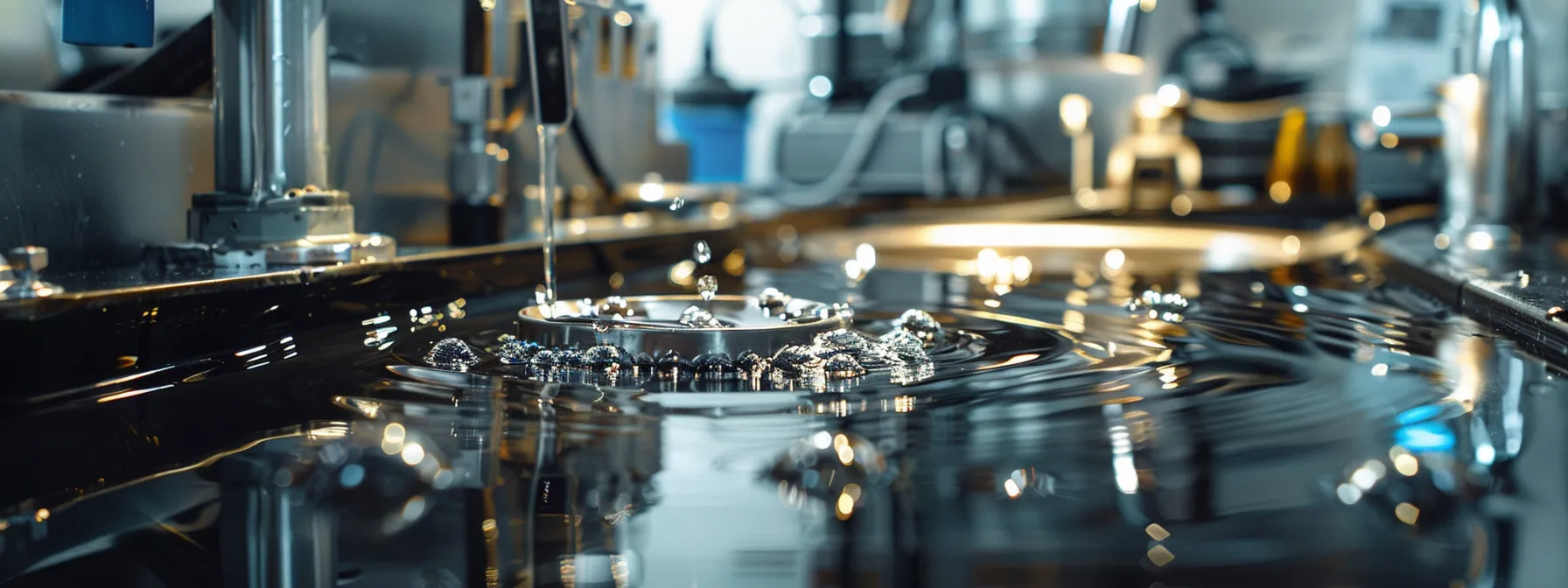
Recognizing the signs of severe blockages is crucial for homeowners to prevent further plumbing issues. Evaluating the limitations of DIY methods can help determine when it is necessary to seek professional drain services. Understanding these elements ensures that individuals can make informed decisions regarding their plumbing needs and get timely support for persistent clog challenges.
Identify Signs of Severe Blockages
Homeowners should be vigilant for several indicators that signal a severe blockage in their plumbing system. Frequent clogs, especially those that reoccur shortly after using DIY methods, suggest that the issue is more than a simple obstruction and may require professional drain cleaning services. Additionally, if water backs up in multiple fixtures simultaneously, it can indicate a main drain line issue that needs urgent attention.
Unpleasant odors emanating from drains often accompany a severe blockage, indicating trapped waste that is decomposing within the plumbing system. Homeowners should not ignore signs such as gurgling noises or slow drainage over time, as these can point to significant underlying problems. Timely action and consultation with professionals can prevent further damage and restore proper drainage efficiently:
| Sign of Severe Blockage | Indicator |
|---|---|
| Frequent Clogs | Recurring blockages after DIY attempts |
| Multiple Fixture Backup | Water backing up in sinks, tubs, or toilets |
| Unpleasant Odors | Foul smells coming from drains |
| Gurgling Noises | Strange sounds from drains during use |
Evaluate DIY Method Limitations
Homeowners often find themselves relying on DIY methods for drain unclogging, but it is essential to recognize their limitations. While techniques such as using baking soda and vinegar can be effective for minor obstructions, they may not address deeper or more complex clogs. Persistent issues, such as frequent backups or multiple drains becoming clogged simultaneously, may indicate more significant plumbing problems that require professional drain cleaning services.
Furthermore, some DIY approaches can inadvertently cause damage to plumbing systems if misused. For instance, excessive force with plungers or repeated use of harsh chemicals can harm pipes over time. When homeowners encounter severe blockages or ongoing issues, seeking professional help ensures proper diagnosis and resolution, providing peace of mind and maintaining the integrity of their plumbing system.
Learn About Professional Drain Services
Professional drain services offer homeowners the expertise needed to address complex plumbing issues that may go beyond simple DIY methods. Trained technicians are equipped with advanced tools and techniques, such as video inspections and hydro jetting, to accurately diagnose and effectively remove stubborn blockages. For those experiencing frequent or severe clogs, seeking these services can prevent further damage to plumbing systems while ensuring a thorough resolution to ongoing issues.
Additionally, professional drain cleaning services provide peace of mind, as licensed and insured experts understand the nuances of various plumbing systems. They can identify underlying issues that DIY attempts may overlook, such as damaged pipes or improper installations. By opting for professional assistance, homeowners not only resolve current clogs but also enhance the long-term health and functionality of their drains, ultimately safeguarding their property’s plumbing infrastructure.
Essential Key Takeaways for Effective Drain Unclogging Methods
Understanding gentle yet effective methods for drain unclogging is essential for maintaining a healthy plumbing system. Employing natural solutions, basic tools, and preventive measures allows homeowners to tackle minor clogs while minimizing environmental impact. Recognizing the signs of severe blockages ensures timely professional intervention, preventing costly repairs down the road. By taking proactive steps and utilizing sustainable techniques, individuals can preserve their drains’ functionality and enhance their home’s plumbing health.

